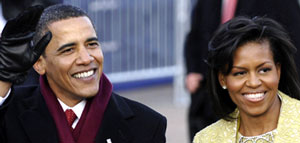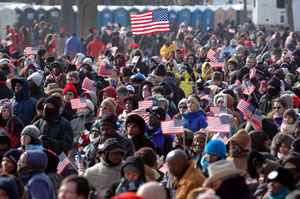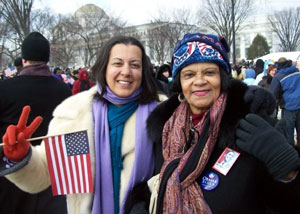ASKIAM
Senior Correspondent
44th president pushes ahead with agenda for the country, keeps promises in his first week

WASHINGTON (FinalCall.com) – President Barack Hussein Obama stepped confidently onto the pages of history Jan. 20, calling a nation weary from an unnecessary, pre-emptive war and the worst economy since the Great Depression, to remake itself, to reaffirm its enduring spirit, and to choose its “better history” in order to fulfill“the God-given promise that all are equal, all are free, and all deserve a chance to pursue their full measure of happiness.”
Under sunny skies which warmed the millions of people crowding the National Mall and the Inaugural Parade route, people who had waited for hours in the frigid cold and brisk winds cheered, and applauded wildly, as the young, new president-to-be stepped to the inaugural platform to chart a course for the country’s future.
It was an electric hour, as the first Black man took the Oath of Office to lead the United States of America. He was standing on the West Steps of the U.S. Capitol, which more than 200 years earlier had been built with the labor of African slaves. Thousands and thousands of cameras flashed in the gray distance, recording and illuminating the moment from the Capitol to the Lincoln Memorial.
“On this day, we gather because we have chosen hope over fear, unity of purpose over conflict and discord,” the new president said in his address.“On this day, we come to proclaim an end to the petty grievances and false promises, the recriminations and worn out dogmas, that for far too long have strangled our politics.”
The president spoke to allay the declining confidence across the country, the “nagging fear that America’s decline is inevitable, and that the next generation must lower its sights. Starting today, we must pick ourselves up, dust ourselves off, and begin again the work of remaking America,” said President Obama.

For many observers, the historic occasion, just one day after the observance of the Dr. Martin Luther King Jr. Holiday, and the historic campaign meant that inevitable comparisons would be made between the new president and fulfillment of “The Dream” of Dr. King. “My answer to that is no, not in any way, shape, or form,” Dr. Wilmer Leon, associate professor of political science at Howard University told The Final Call.
“We can’t confuse the inauguration of President Obama … I consider that a ‘down payment’ on the dream, but the balance is still due in that Dr. King’s vision and dream was never about electing a Black man as president. It was about brotherhood. It was about racial equality. It was about social equality for the poor. So, to just think that now because there’s a man of color who has taken the oath of office, and now all is good, and all is right with the world, that, I thought, was utterly ridiculous.
“Also, people thinking that this election is the fulfillment of the Dream ignores totally the Black electoral politics that this historic moment comes out of, going all the way back to 1872 and Frederick Douglass’s name being entered into nomination for the Equal Rights Party. There’s a whole history here that is totally ignored when you think that this is the fulfillment of the Dream,” Dr. Leon said.
The swearing in of the new president provides an opportunity to force voices of peace into the mainstream of the decision-making process, according to Harry Belafonte, the legendary singer, actor, and humanitarian who was a constant companion of Dr. King. “When John Kennedy was the president of the United States of America, and we had an inaugural ball and all the festivities, this nation was filled with a great sense of hope in the future,” Mr. Belafonte said at the Inaugural Peace Ball, co-sponsored by the U.S. Postal Museum and the Busboys & Poets restaurant chain.
“And what we understood was that only those who were committed to peace, those who were committed to the civil rights movement, those who were committed to the women’s movement, those who were committed to progressive politics, had a critical role to play, and that was to be the caretakers of truth and the political future of America. John Kennedy came, not fully understanding the measure of that responsibility until we sat with him on numerous occasions to convince him that what we stood for was honorable, was moral and politically correct.
“We have to do exactly the same thing with Barack Obama. If he fails, it is because we have failed. And if we succeed, there is no question that he will succeed,” Mr. Belafonte continued.
For his agenda, President Obama said it is time for swift and bold action to create new jobs and lay a foundation for growth. Congressional Democrats have readied an $825 billion stimulus plan of tax cuts and spending for roads, bridges, schools, electric grids and other projects, while some economists warned that may not be enough.
“The question we ask today is not whether our government is too big or too small, but whether it works,” Mr. Obama said.
In one of his first moves as president, Mr. Obama Jan. 21 made a clean a break from the Bush administration, keeping a key promise made during his campaign. He ordered a four-month suspension of all military tribunals at the U.S. prison at Guantanamo Bay, Cuba, and the closure of the Guantanamo prison within a year. He also ordered the immediate closure of secret overseas CIA prisons and for all agencies, including the CIA, to abide by the U.S. Army Field Manual’s acceptable interrogation tactics.
On his first day in office, President Obama also nullified every legal order and opinion on interrogations issued by any lawyer in the executive branch after Sept. 11, 2001, effectively ending the Bush administration’s so-called “war on terror.”
“President Obama has not done anything unexpected. He’s lived up to at least one of his promises thus far, moving toward closing up Guantanamo Bay. That certainly played well for him. He’s attempting to move very quickly on his economic stimulus package and that’s going to take a little longer, but he’s moving that way. Everything he’s done thus far has been fairly well choreographed, at least on the outside. In terms of symbols, he’s done okay in trying to bring openness to the federal government and making himself available,” said Dr. William Boone,a Clark Atlanta University political science professor.
“It’s real early to talk about real kinds of substantive questions just yet because we’ll just have to see how the final package plays out on the economic package and how they really play it out in terms of Guantanamo. Nevertheless, I think that overall he did fairly well in his first week.”
Glen Ford, of BlackAgendaReport.com, was “impressed by an action that some people might consider to be minor and that is he released the ban from the public of seeing presidential papers for 12 years, now apparently we’ll be able to look into papers of presidents as soon as they leave office, which is a good thing for history and for news people.”
“He’s continued some of the policies that were in place with Bush. Very specifically, there were two U.S. drone attacks on Pakistan. These attacks were carried out under a directive that President Obama approved.I happen to believe that Pakistan is the most volatile, dangerous country for everybody’s interest in the world and that Barack Obama’s willingness to become more aggressive, even than Bush, based on his campaign rhetoric, in violating Pakistan’s territorial integrity, which can only result in outraging that very large and very volatile country,” Mr. Ford continued.
And, he argued, “The closure of Guantanamo is not enough.There are 200 and something detainees at Guantanamo, however, at Bagram Air Base in Afghanistan, a U.S. Airbase, there are twice that many detainees who are held under very, very similar conditions for very similar reasons.So Bagram is not a watchword.People don’t say ‘U.S. out of Bagram,’ because a lot of people don’t even know the name of the base, but in fact it is another Guantanamo, one that is much bigger and it’s not about to close. If the president is sincere about not just getting rid of a symbol that is Guantanamo as a symbol of U.S. illegal behavior in the world than he should be closing Bagram at the same time that he closes Gitmo, and that can be seen as a sincere change of policy.”
Dr. Maulana Karenga, longtime activist and professor of Africana Studies at California State University–Long Beach, said Mr. Obama “stopped all that wild west action and closed down those torture chambers … That’s an important thing for Black people to see a person do the first day they get in, revoking those things, closing down those so-called prisons, those torture prisons and banning torture that Bush instituted as a legal process. That’s an excellent way to begin, to go in and even mention the Palestinians.To call their president first to even show that they have suffering also, even though he still didn’t say what the source of it was and he still leans too heavily towards Israel, but his ability to move away from that position depends on you,” Dr. Karenga told an audience Jan. 25 during a discussion of the King legacy and President Obama in Los Angeles.
President Obama has to spend more time talking about working people and not just the middle class because people need a fair and equitable share of the social goods of the country, meaning shared wealth, shared power and shared status, said Dr. Karenga, who is also the founder of Kwanzaa.
Mr. Obama also ordered all federal agencies to suspend unfinished Bush administration federal regulations, pending review by the new White House. In its closing days, the Bush administration reported it had issued 100 new regulations since the November elections.
The president also placed the state of the economy on the front-burner, equal to that of national security, promising to add a daily economic briefing from financial experts to his schedule, along with his daily national security intelligence briefings.

“For everywhere we look, there is work to be done,” Mr. Obama said in his inaugural address.“The state of the economy calls for action, bold and swift, and we will act–not only to create new jobs, but to lay a new foundation for growth.
“We will build the roads and bridges, the electric grids and digital lines that feed our commerce and bind us together. We will restore science to its rightful place, and wield technology’s wonders to raise health care’s quality and lower its cost.”
The president also made his first comments on the Middle East conflict since Israel’s attack on Gaza. Mr. Obama reaffirmed his commitment to Israel’s security, but did not affirm a commitment to Palestinian security. He condemned Palestinian rocket attacks on southern Israeli towns, but he did not criticize the U.S.-backed Israeli bombings of densely populated Gaza.
But in a clear departure from the Bush administration, Pres. Obama acknowledged Palestinian suffering and said Gaza’s borders should be opened to humanitarian aid. “I was deeply concerned by the loss of Palestinian and Israeli life in recent days and by the substantial suffering and humanitarian needs in Gaza. Our hearts go out to Palestinian civilians who are in need of immediate food, clean water and basic medical care, and who’ve faced suffocating poverty for far too long,” Mr. Obama said Jan. 22. “Now we must extend a hand of opportunity to those who seek peace. As part of a lasting ceasefire, Gaza’s border crossings should be open to allow the flow of aid and commerce, with an appropriate monitoring regime, with the international and Palestinian Authority participating. Relief efforts must be able to reach innocent Palestinians who depend on them.”
In addition, Mr. Obama signaled another departure from former Pres. George W. Bush, mentioning the Arab League peace initiative, which would offer Israel normalized relations in return for a full withdrawal from the Occupied Territories and a just resolution for Palestinian refugees. The Bush administration had backed Israel’s rejection of the offer and its expansion of settlements in the Occupied West Bank.
“I should add that the Arab peace initiative contains constructive elements that could help advance these efforts. Now is the time for Arab states to act on the initiative’s promise by supporting the Palestinian government under President Abbas and Prime Minister Fayyad, taking steps towards normalizing relations with Israel, and by standing up to extremism that threatens us all.”
One observer however considers the new Obama Middle East policy to be little more than a warmed-over version of the Bush policy. “It’s approximately the Bush position,” said acclaimed Middle East expert Dr. Noam Chomsky, professor of linguistics at the Massachusetts Institute of Technology for more than 50 years during an appearance on Pacifica Radio’s “Democracy Now!”
“(President Obama) began by saying that Israel, like any democracy, has a right to defend itself. That’s true, but there’s a gap in the reasoning. It has a right to defend itself. It doesn’t follow that it has a right to defend itself by force. So we might agree, say, that, you know, the British army in the United States in the colonies in 1776 had a right to defend itself from the terror of George Washington’s armies, which was quite real, but it didn’t follow they had a right to defend themselves by force, because they had no right to be here. So, yes, they had a right to defend themselves, and they had a way to do it–namely, leave. Same with the Nazis defending themselves against the terror of the partisans. They have no right to do it by force.”
In his inaugural address, Mr. Obama reached out directly to the Muslim world and possible opponents on the global stage. “To the Muslim world, we seek a new way forward, based on mutual interest and mutual respect.To those leaders around the globe who seek to sow conflict, or blame their society’s ills on the West–know that your people will judge you on what you can build, not what you destroy.To those who cling to power through corruption and deceit and the silencing of dissent, know that you are on the wrong side of history; but that we will extend a hand if you are willing to unclench your fist.”
(Charlene Muhammad contributed to this report.)












